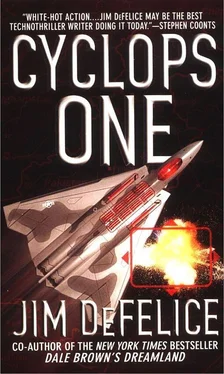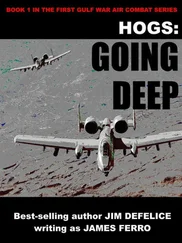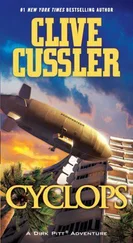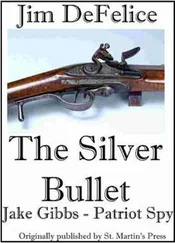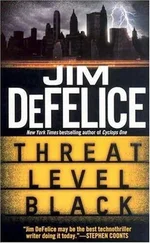Bonham smiled. The President had used that phrase, and a number of commentators had picked it.
“I think it’s a bit premature,” said Bonham.
“My cousin thought the augmented ABM system more critical,” said Taft.
Bonham smiled again, though this time much more tightly. Though anyone who really mattered would surely know who the men and their relationships were, Bonham nonetheless would have preferred that Megan’s name not be mentioned. She surely would have preferred that herself.
“The antimissile system is critical,” said Segrest. “And when we get the contract, it will be a windfall.”
More than a windfall, you greedy bastard, thought Bonham, sipping his wine. Segrest controlled a considerable portion of the Jolice and related portfolios, and so he had to be dealt with very carefully. Still, Bonham fantasized about the day when he would tell the fat pomposity to get out of his office.
His White House office.
“Don’t be premature,” Bonham said mildly.
“We’ll score well in the next round of tests,” said Segrest. He looked at Taft. “The congressman agrees.”
Bonham realized belatedly that Segrest wasn’t merely boasting: He was demanding that the weapon be used in the next round of tests.
“The tests will show what the tests show,” said Bonham. He could feel his throat starting to close. “Anything can happen. Whatever the results, Jolice should be funded. An argument is there.”
“More than an argument when the results of the first test are duplicated.”
He was ordering it. Ridiculous!
Bonham picked up the napkin from his lap and daubed at the sides of his mouth, surreptitiously glancing around the room to make sure no one was listening.
The plan was to dismantle the weapon and the base, and to leave. Anything else was far too risky — for him especially. He’d gone to great lengths to cover their tracks.
And why, really? Because of greed. Because Jolice and its backers stood to gain billions if the augmented ABM system was built. Never mind that it might not work. Never mind that companies much better suited to build it — Lockheed and Boeing, for example — were being flim-flammed out of the competition.
Meagan York’s motives were pure, but no one else’s were, not even his. He wanted power, not money; at least he had the wisdom to realize when they’d gone too far.
“I believe the weather in the Pacific is very tempestuous,” Bonham said, as close to a hint as he dared.
“Nonsense,” said Segrest. “The weather there has never been better. Don’t you agree, Congressman?”
“Oh yes,” said Taft.
“We have to move along the course I’ve outlined,” said Bonham. He kept his voice low; still, he worried about being overheard.
“No. That’s far too cautious. You’re conservative, General, a conservative by nature.” Segrest’s voice was so loud, it could have been a toast. Bonham pushed his teeth together, sure that others were staring. “The future — imagine the possibilities.”
“Yes,” said Bonham.
“Very rich possibilities,” said Segrest, signaling to the waiter for more wine.
The first day after the crash, McIntyre managed to walk only a few hundred yards beyond the ravine where the helicopter had gone down. He lost his strength somewhere after midday and, lying down to rest, fell fast asleep. When he woke it was dark; he went back to sleep and didn’t open his eyes until the sun forced them open. He got up and began walking. After a while he realized the aches and stiffness he’d felt had melted into a gnawing hole in his stomach, something he thought must be hunger, though it felt slightly different than that, as if his stomach had been emptied and then twisted in his body.
McIntyre came to a hillside so sheer that the only way was to slide on his butt. He couldn’t find a comfortable way to hold the guns and finally decided to loop the straps around his neck. As he started to push down he changed his mind, thinking it would be better to crawl on his belly, but it was too late: Unable to stop himself, he slid sideways, then rolled and kept going until he slammed against some rocks. The gray hands that had climbed over his eyes pressed in and he lost consciousness.
He was out for an hour, maybe more. Then the ground in front of his face turned blue. He opened his eyes and saw that he was about fifty feet above a trail through a valley. Bushes began to rise in the terrain about twenty yards to his right, gradually becoming thicker until the entire valley was covered in lush green.
McIntyre picked up the guns from his chest and got to his feet. He slid a few yards, walked a bit, then gave way to his momentum and began trotting down the hill. For a second his aches, pains, and bruises disappeared. He reached the bottom of the hill and caught his breath, hyperventilating slightly. His head remained clear.
The blood on his clothes had dried into stiff patches that felt like pieces of wood. He wasn’t hungry, but his mouth was dry.
His butt hurt, as though the bone in his rear end had been broken.
He had his phone there. He’d put his phone there yesterday, then completely forgotten, blacked out before he could use it.
McIntyre began to laugh. He laughed so hard he rolled over, face in the dirt. All I’ve got to do, he thought, is just call someone and tell them to pick me up. Send a taxi. Send a friggin’ taxi!
The laughter caught in his throat and he began to spit. His phlegm came out in red gobs. When he stopped, McIntyre reached back for the phone. Had he tried it yesterday? He didn’t think he had, but yesterday was a jumble, the crash was a jumble. He remembered hitting the Indian captain who had kidnapped him, and walking, but nothing else.
McIntyre put his thumb on the Power button and held it down. When he let it off, the display flashed green, then faded; he couldn’t tell in the direct sunlight whether the phone was working or not.
At first he thought it was dead. His chest rippled and tears erupted from his eyes. He dropped the phone and hunched over his knees, weeping in despair. He saw himself from the distance; he sneered at the miserable wretch who was so pathetic.
He hadn’t cried since he was a little boy, six or seven years old. Crying was a thing sissies did, and girls, and he was neither.
Shaking, he tried the phone again. Holding it sideways this time to avoid the sun’s glare, he realized that it was in fact working. The battery was only at half power, but the phone was working.
He thumbed the menu up, got the main switchboard, hit Send.
McIntyre put the phone to his ear.
He heard nothing.
“NSC.”
“Hello?”
“Hello? I’m having trouble hearing you.”
“This is McIntyre,” he said. “I’m in India, I think. There was a crash.”
The operator didn’t say anything, and for a long moment McIntyre thought he had lost the connection. Then there was another voice on the line, a louder voice, male, vaguely familiar.
“Mac…this is James Brott. Where the hell are you?”
Brott was one of the intelligence liaisons, a CIA officer over on assignment.
“I’m in India.”
“Are you all right? We’re starting to track the call and get a location. Do you know where you are? Do you have a GPS?”
“No.” McIntyre spoke softly, as if someone were nearby. The crying jag had taken his anxiety away; he wanted to tell Brott everything and yet he felt calm, or almost calm. “We were flying near the Pakistani border, west of a base called Pekdelle. I’m not sure I’m pronouncing it right. They took me on the attack. I guess they were going to either throw me out of the helicopter or make it look like the Pakistani soldiers killed me.”
Читать дальше
